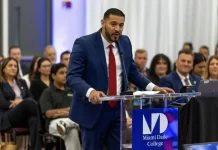
I was studying law at Harvard when the first “special prosecutor” was appointed. His name was Archibald Cox and he taught Constitutional law at the law school.
As it happened, he and I were the first two people to arrive at the law school cafeteria, which opened at 7:30 a.m. I saw him sitting by himself, reading the Boston Globe, whose headlines referred precisely to Cox’s appointment.
I admired Cox for his brilliance and his rectitude. I also identified with him in a special way when he chose my own constitutional law professor, Philip Heymann, as his deputy in the investigation and prosecution of the president’s involvement in the Watergate scandal. When both professors came back to teach law (after being fired in circumstances similar to the Comey firing by Trump), Heymann became my advisor in a law school paper on the topic of Congressional immunities.
That paper was later published as a law review article.
Unfortunately, the eminent law professor fell into the same trap as many prosecutors and lawyers who I have recently heard opining on the possibility that the current president could be charged criminally with “obstruction of justice” for firing the director of the FBI – while said official was supervising an investigation that allegedly deals with the president’s own conduct. The flaw in their analysis is that they are treating “obstruction of justice” in the criminal-law sense of the word.
This approach is tantamount to ignoring the role of the president in our system of government. I heard one former U.S. Attorney say that it would depend greatly on whether Comey felt “threatened” with dismissal if he carried out his functions in the Russian-interference-with-US-e
The book to read on that is by Bob Woodward, and is titled “Shadow.” What Woodward describes, beginning with Watergate, and ending with the silly and sorry episode involving a president being impeached for having consensual sex with an intern named Monica Lewinsky. It is a four-decade history of a Congress unwilling to do its constitutional duty under the impeachment provisions and simultaneously unable to rein in a judiciary that is only too willing to take over the entire field of presidential misconduct.
In the Clinton impeachment “prosecution,” the president was charged with providing “perjurious, false and misleading testimony” in a civil case related to the Lewinski scandal. But that is precisely where prosecutors and courts have failed to understand the exquisitely balanced governmental scheme concocted by the Founders of this great democracy. A correct analysis of that entire embarrassing and costly odyssey would conclude that there is no basis whatsoever to elicit testimony from a sitting president in a civil matter, particularly where the testimony deals with his own conduct in engaging in sexual acts with a consenting adult. That certainly does not qualify as an impeachable offense, which is defined as “treason, bribery or other high crimes and misdemeanors.”
The official immunity of a president should be understood in light of the legislative immunity of Congressmen, under Article I, Section 6 of the Constitution – from which, parenthetically, all official immunities derive. That provision makes clear that a Congressman shall not be questioned “in any other place” than the legislature itself. To suggest that presidents can be brought before a grand jury or a judge to be questioned about exercising a proper presidential power (dismissal of an official who serves at his pleasure) is a colossal failure to understand the constitution, which vests the power of impeachment exclusively on the Congress.
Congress is right to investigate the extent to which a sitting president interferes with an ongoing investigation by his own department of justice. Its powers are unlimited in this area, and its judgment whether to impeach or not is undiminished and inalterable by either a court or an executive. But it should not do so using either procedures or substantive law derived from the canons that apply to common criminals.
Moreover, Congress has its own power of subpoena and its own power to sanction those who disobey by holding them in contempt of Congress. It can hire its own investigators, question under oath whomever it wants – including the president himself – and issue articles of impeachment not only for improper conduct but for obstructing its own investigation.
Congress could theoretically find that the presidential dismissal of an FBI director is an impeachable “high crime or misdemeanor.” But a court cannot – not even the Supreme Court.
Why lawyers and prosecutors cannot understand that is beyond me.





